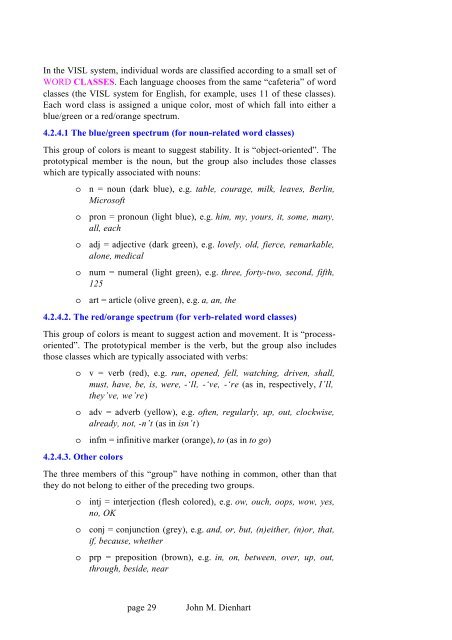Download - VISL
Download - VISL
Download - VISL
You also want an ePaper? Increase the reach of your titles
YUMPU automatically turns print PDFs into web optimized ePapers that Google loves.
In the <strong>VISL</strong> system, individual words are classified according to a small set of<br />
WORD CLASSES. Each language chooses from the same “cafeteria” of word<br />
classes (the <strong>VISL</strong> system for English, for example, uses 11 of these classes).<br />
Each word class is assigned a unique color, most of which fall into either a<br />
blue/green or a red/orange spectrum.<br />
4.2.4.1 The blue/green spectrum (for noun-related word classes)<br />
This group of colors is meant to suggest stability. It is “object-oriented”. The<br />
prototypical member is the noun, but the group also includes those classes<br />
which are typically associated with nouns:<br />
o<br />
o<br />
o<br />
o<br />
o<br />
n = noun (dark blue), e.g. table, courage, milk, leaves, Berlin,<br />
Microsoft<br />
pron = pronoun (light blue), e.g. him, my, yours, it, some, many,<br />
all, each<br />
adj = adjective (dark green), e.g. lovely, old, fierce, remarkable,<br />
alone, medical<br />
num = numeral (light green), e.g. three, forty-two, second, fifth,<br />
125<br />
art = article (olive green), e.g. a, an, the<br />
4.2.4.2. The red/orange spectrum (for verb-related word classes)<br />
This group of colors is meant to suggest action and movement. It is “processoriented”.<br />
The prototypical member is the verb, but the group also includes<br />
those classes which are typically associated with verbs:<br />
o<br />
o<br />
o<br />
4.2.4.3. Other colors<br />
v = verb (red), e.g. run, opened, fell, watching, driven, shall,<br />
must, have, be, is, were, -‘ll, -‘ve, -‘re (as in, respectively, I’ll,<br />
they’ve, we’re)<br />
adv = adverb (yellow), e.g. often, regularly, up, out, clockwise,<br />
already, not, -n’t (as in isn’t)<br />
infm = infinitive marker (orange), to (as in to go)<br />
The three members of this “group” have nothing in common, other than that<br />
they do not belong to either of the preceding two groups.<br />
o<br />
o<br />
o<br />
intj = interjection (flesh colored), e.g. ow, ouch, oops, wow, yes,<br />
no, OK<br />
conj = conjunction (grey), e.g. and, or, but, (n)either, (n)or, that,<br />
if, because, whether<br />
prp = preposition (brown), e.g. in, on, between, over, up, out,<br />
through, beside, near<br />
page 29<br />
John M. Dienhart
















